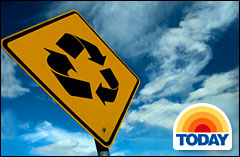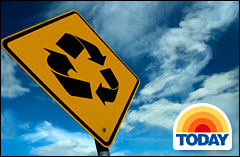
Grist’s Katharine Wroth and Chip Giller appeared on NBC’s Today show on Tuesday, Nov. 6, telling Meredith Vieira how to recycle some of the odd and awkward items that you can’t put out in your curbside bin.
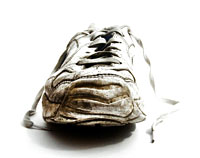
Athletic Shoes
Got a pair (or a pile) of old sneakers that are too gross and grotty to give to charity? Nike will recycle any brand of athletic shoe through its Reuse-a-Shoe program. Run your shoes over to any Nike store, or mail them straight to the company’s recycling center — details here. Nike processes and recycles the footwear to make sports surfaces for basketball courts, tennis courts, running tracks, and playgrounds. Right now, they’re collecting shoes to make athletic surfaces for New Orleans, to help get kids back out on the courts even as the city rebuilds. To date, about 20 million pairs of athletic shoes worldwide have been recycled through the program.
Computers
Computers are full of toxic nasties, so you definitely shouldn’t put them out with the trash — and yet recycling them can be a challenge. For years, activists have been pushing computer manufacturers to assume responsibility for their products by taking them back at the end of their useful lives and recycling them conscientiously, or, better yet, putting the old parts to use in new machines.
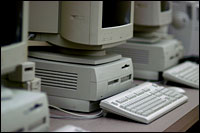
Finally, some major manufacturers are stepping up to the plate with recycling programs. Dell’s program is the best so far: the company will recycle any of their computers at no cost, and if you buy a new machine from them, they’ll recycle your old one no matter what the brand. Other major computer companies have come up with programs too — including Apple, Gateway, Hewlett-Packard, and Toshiba — but they generally charge a fee, require you to purchase a new computer, or have other restrictions. The Computer TakeBack Campaign has put together a handy, info-packed rundown of manufacturers’ take-back programs.
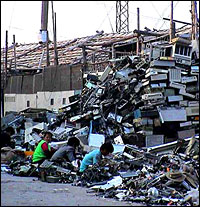
Photo: © Basel Action Network 2006
The Computer TakeBack Campaign can also point you to independent recyclers who meet high standards for eco-friendliness and labor conditions. Less reputable recyclers ship electronics to the developing world, where they’re dumped in huge heaps and disassembled under dangerous conditions by untrained, unprotected workers and even children. Some recyclers also send goods to be dismantled by U.S. prisoners in unsafe conditions.
Better than recycling, of course, is finding someone who can use your old computer; the National Cristina Foundation helps put donated computers to good use.
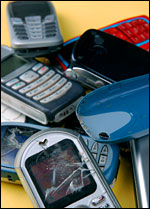
Cell Phones, Pagers, and PDAs
Small electronics are full of big toxics too, so they also need to be recycled properly. The nonprofit CollectiveGood collects and recycles old phones, pagers, and PDAs. When possible, the group refurbishes them and puts them to use in developing countries. Otherwise, the items are broken down in an eco-friendly process and the metals are separated out for reuse or proper disposal. You can mail your old phone to CollectiveGood and get a tax credit for the donation, or you can just drop it off at any Staples store in the U.S.
To find out more, dial up a Q&A with CollectiveGood’s president, Seth Heine.
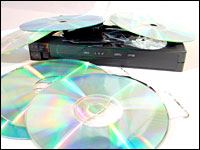
CDs, VHS Tapes, and Other Techno-trash
Computers and cell phones aren’t the only techno-trash cluttering your cupboards; think of all those CDs, VHS tapes, game cartridges, digital cameras, MP3 players, cords, cables, cassettes — not to mention bigger items like VCRs and computer monitors. Fortunately, there’s one company that will take it all off your hands and reprocess it in an eco-friendly way: GreenDisk. Just mail your e-waste to the company and they’ll take care of the rest. The cost starts at $6.95 for 20 lbs. of equipment — a small price to pay to relieve your conscience (and your closet).
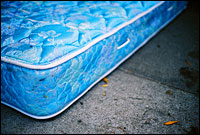
Mattresses, TVs, and Other Hard-to-Get-Rid-of Items
In most areas of the U.S., you can’t recycle your mattresses, and they’re even hard to give away — charities like Goodwill often refuse to take them. Old TVs can be tough to unload too. But if your items are still in functional condition, consider that other R, “reuse,” instead of just “recycle.”
One of the best ways to give new life to your old belongings is through the Freecycle Network, an online community with chapters all over the U.S. and around the world, through which people offer up items they no longer want and other people happily snap them up. (Read an article about Freecycle’s founding.) The online bulletin board Craigslist, which also has hundreds of local versions, has a section where you can offer things up for free too. You can get rid of just about any usable item (and some items you didn’t even think were usable) via Freecycle and Craigslist, and you can find great free stuff too.
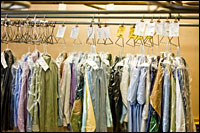
Dry-Cleaning Hangers and Plastic
Hung up on what to do with those wire hangers from the dry cleaners? Some dry cleaners will take them back and reuse them, and some tailors and alteration shops will take them as well — so just ask. What about all the plastic that comes back from the dry cleaners too? In some cities, you can recycle it right along with other plastic bags, so check your local recycling guidelines. You may also be able to return the plastic to the dry cleaners to be recycled.
But really, just try to ditch dry cleaning altogether. The hangers and plastic are the least of its eco-problems — the more serious matter is the toxic solvent used in the process, perchloroethylene or “perc,” a suspected carcinogen. (California and other areas are requiring cleaners to phase perc out, but that will take years.) Try to find a “wet cleaner” or other eco-friendly cleaning company in your area; NoDryClean.com has a database. You can also hand-wash some garments, and avoid buying clothes that say “dry clean only.” Read more about dry-cleaning dangers and alternatives from Grist advice columnist Umbra Fisk.

Beer Bottles With a Lime Wedge
Can you recycle a beer bottle even if a lime wedge is stuck in it? Or a cigarette butt? What about a peanut-butter jar with sticky goodness still in the bottom? Yes, yes, and yes: just put it all in with your regular glass recycling; the recycling plant should be able to remove most contaminants. Umbra explains all about it.

There’s More Where That Came From
Looking for additional ways to green your lifestyle and protect the environment? Take a gander at Grist’s new book, Wake Up and Smell the Planet. It’s chock-ful of friendly advice, and 100% free of preachiness and pomposity.
Also check out energy-saving tips from Chip’s Nov. 5 Today show appearance.
Did you notice those stylish duds Katharine and Chip were sporting on the Today show? They were generously donated by Nau, an eco-friendly outdoor-apparel company. Read a Q&A with Nau’s sustainability manager, Eric Brody, and check out the Nau website.
